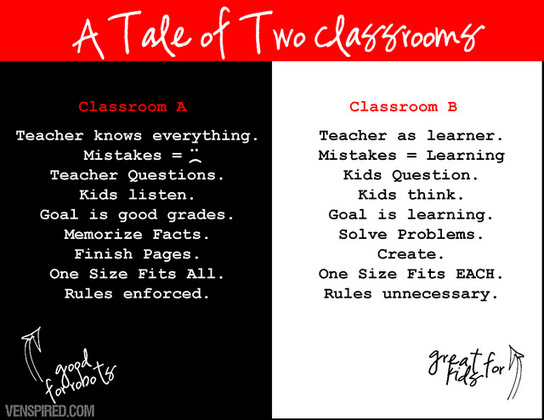---------------------------------------------------------------
Goal is Learning
Don't get me started.
The idea that the goal of schools is "Learning" is a major theme of mine. Last year I wrote a piece called Are Your Students Obsessed with Grades. In this post I included a list of things that students do that suggest they are more concerned about grades than then are about learning. Some of these include:
The idea that the goal of schools is "Learning" is a major theme of mine. Last year I wrote a piece called Are Your Students Obsessed with Grades. In this post I included a list of things that students do that suggest they are more concerned about grades than then are about learning. Some of these include:
- They are constantly asking, "Is this going to be graded?"
- They refuse to do anything if it is not being graded.
- They ask for "extra credit" or make-up work at the end of the marking term to raise their grade to the next letter grade.
These sort of behaviors from students suggest that we have created what I have called The Grading Monster in our schools. Grades and grading and Grade Point Averages (GPAs) have grown to oversized importance in the minds of students (and sometimes in the minds of parents) to the point that many have forgotten that the goal of school is learning.
 Of course, we need a way to measure the degree or the level at which students are learning. But that method of measuring is not the goal of schooling. It is the result of schooling. I wrote a piece called Learning vs. The Appearance of Learning last year. In this post I talked about the problem of seeking grades over seeking learning. You might think that they are the same: If I get a good grade, than I must be learning. But this isn't always the case. Grades can sometimes be manipulated to be artificially high--which would give the student (and the parent) the appearance of learning. And I'm not talking about grade inflation--which is the purposeful and unearned raising of grade. I'm talking about students who (perhaps) always do their homework and always participate in class and (perhaps) don't do very well on tests and quizzes; but the way the final grade is calculated causes them to end up with a decent grade even though they didn't actually learn very much.
Of course, we need a way to measure the degree or the level at which students are learning. But that method of measuring is not the goal of schooling. It is the result of schooling. I wrote a piece called Learning vs. The Appearance of Learning last year. In this post I talked about the problem of seeking grades over seeking learning. You might think that they are the same: If I get a good grade, than I must be learning. But this isn't always the case. Grades can sometimes be manipulated to be artificially high--which would give the student (and the parent) the appearance of learning. And I'm not talking about grade inflation--which is the purposeful and unearned raising of grade. I'm talking about students who (perhaps) always do their homework and always participate in class and (perhaps) don't do very well on tests and quizzes; but the way the final grade is calculated causes them to end up with a decent grade even though they didn't actually learn very much.
For many people, the idea of viewing schools as having the goal of learning will require a major shift in their thinking. However, for individual classrooms and individual teachers this can be accomplished through relatively minor steps.
- Encourage student discourse - Allow students to ask questions and offer ideas and solutions without judging the "correctness" of these ideas right away. Allow other students to question these ideas and suggestions.
- Formative assessments - Exit passes, classwork assignments, activities that provide feedback to students that is not a grade. Instead the feedback could be teacher (or student) comments relative to the thinking that they have expressed in the assignment and (perhaps) suggestions for going further with that thinking.
- Allow a little productive struggle and recognize students who tried and didn't get it the first time and tried again. Help students to see that effort is important in the learning process. Everything isn't "a grade". No one expects students to "get it" the first time they are learning something new.
There is a movement to abolish grades altogether in the effort to help students (and parents) to see the importance of learning. I don't think that this will come to pass in my career, but if we truly want schools to be viewed as a place of learning, we will see the importance of grades and grading diminish. This is important in the classrooms that we want to have in the 21st century.
Learning is key. Learning is everything. If we aren't in school for learning, than why are we there?


Yes, I am totally agreed with this one. You blog post is truly wonderful and awesome for us. Thanks a lot for sharing this one. Now it's time to avail https://quickshutterrepair.co.uk/ for more information.
ReplyDelete